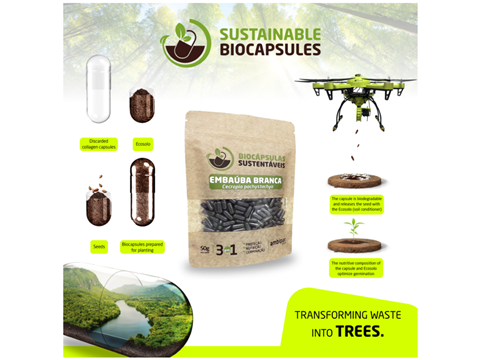
In the lead up to this year’s Sustainable Packaging Summit, taking place in Utrecht on 10th-12th November, we hear from Sustainability Awards finalist Ambipar about its biocapsule packaging, designed to transform collagen and cellulose waste into trees and nominated in the Commercialized Climate category.
You’re a finalist for the Sustainability Awards 2025. Congratulations! To begin, could you summarize your entry in less than 50 words?
Collagen capsule waste and cellulose waste that was previously discarded in landfills are transformed into trees in a bio-stimulating packaging for the remote restoration of degraded areas using innovative drones. Technology has helped restore one of Brazil’s greatest climate disasters and is now expanding to other countries.
Why do you think the judges were impressed with your entry? Tell us what’s innovative about your project and/or its impact on packaging sustainability.
Because we developed a technology using design thinking concepts that helps create impactful innovation for two industrial waste issues - whether pulp and paper or collagen from the pharmaceutical industry - by transforming them into a bio-stimulant packaging product with broad functionality, easy to produce and distribute, serving from seed packaging to nutrition.
This solution helps society and the fight against climate change through innovation and environmental restoration which requires scale, operational safety and economic viability to meet the high demand in degraded, hard-to-reach areas with characteristics that conventional seedling planting systems cannot achieve.
Finally, can you tell us about the ongoing development of your project, for example, how your innovation/initiative was received by the industry or what the next steps are in commercialization/product development?
We developed the entire concept including feasibility testing, environmental certifications, scaled production and distribution for impact projects.
The packaging that stores the bio-capsules also follows the design-thinking concept. Its kraft paper composition with a thin layer of recycled polymer allows for long-term preservation of the bio-capsules, protecting them from moisture and oxygen, which extends the seed’s shelf life.
Both the biocapsule innovation and the packaging itself - conceived with the same design-thinking purpose - aim to facilitate internal viewing of the product (through a transparent strip) without the need to open and damage the packaging. Its size contributes to ergonomic handling and display on commercial shelves, facilitating distribution in retail chains such as gardening stores and supermarkets.
The packaging also features a zip-lock system which allows consumers to open and close it without damaging its structure, allowing them to use only the desired quantity.
These packages can be printed with different colours and contrasts without the need for large, modern equipment or manufacturing limited to a specific niche in Brazil. Instead, they can be produced with low-cost inks on recycled paper.
We’ve implemented environmentally friendly technology, directly contributing to the reuse of pharmaceutical industry waste as an ESG-friendly alternative that’s highly valued by the industry, promoting the circular economy and its large-scale applicability.
In addition to creating sustainable biocapsules and their packaging, we’ve also developed an automatic seeding device that can be attached to drones for controlled and remote dispersal, facilitating access to degraded and hard-to-reach areas and applying the technology at scale.
This allows us to standardize seed sizes of different shapes and weights for use in various seeding processes available on the market, not only in drones but also in agricultural field machinery. This enables us to serve various industrial segments such as pulp and paper, pharmaceuticals, agriculture, and organic inputs, demonstrating continuous development on multiple fronts.
The winners of the Sustainability Awards 2025 will be announced at the Sustainable Packaging Summit, taking place in Utrecht on 10-12 November. The Summit mobilizes leaders of the FMCG value chain, policymakers, NGOs, recyclers and investors to collaborate, remove barriers and identify opportunities on the road to sustainable transformation.
To learn more or register, visit: https://www.packagingsummit.earth/2025
If you liked this story, you might also enjoy:
The ultimate guide to the Packaging and Packaging Waste Regulation in 2025
How are the top brands progressing on packaging sustainability?
Everything you need to know about global packaging sustainability regulation in 2025
The key to increasing the use of reusable packaging in supermarkets














No comments yet